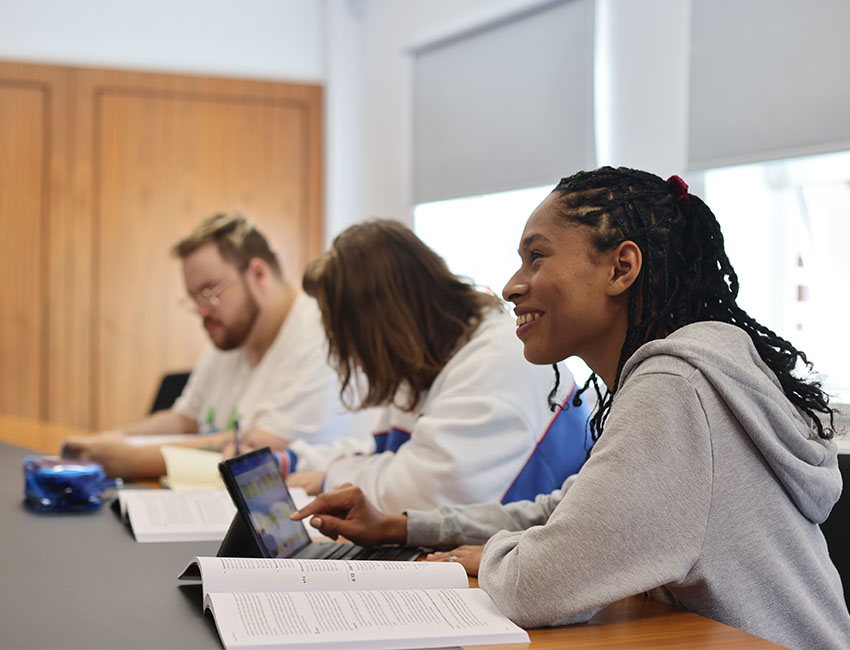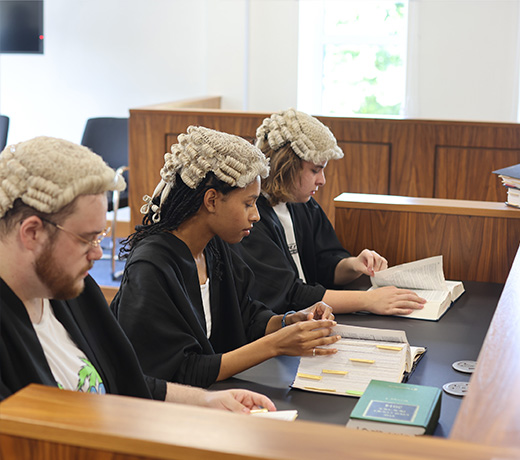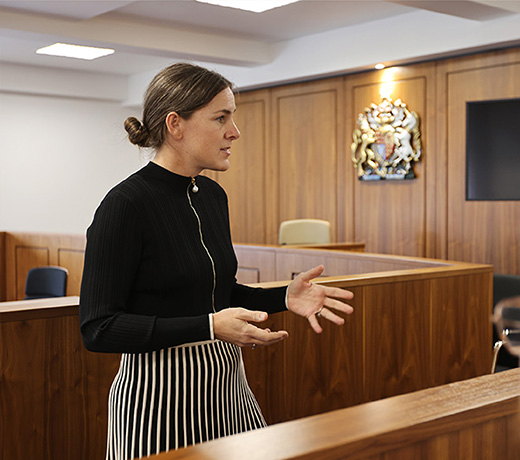At Worcester, you can participate in placement opportunities with local legal firms and take part in simulated mock hearings in our replica law course, giving you the valuable practical experience that will help you stand out from the crowd.
in the UK for Quality Education
in the UK for sustained employment and/or further study
Overview
Law with Criminology adopts a joint approach to criminal justice, where you learn to investigate judicial scenarios through a legal and social lens. You’ll learn the core principles of law, whilst investigating the causes of crime and its impact on individuals, families and society as a whole in your criminology modules.
As you progress through the course, you’ll be able to specialise your studies around your interests. There are lots of optional modules to choose from in your second and third years, with topics including Victimology, Mental Health and Substance Abuse in Criminal Justice and medical law and ethics.
At Worcester, assessment is not all about written assignments and exams. You’ll also be assessed on your legal knowledge through oral presentations, research projects and mock trials in our replica courtroom.
You’ll join a community of law students, all based together in the centre of Worcester, which is a short walk away from the city’s courts and several local law firms. You’ll learn from our expert criminologists and network of high-profile legal professionals, including the Resident Judge of Hereford and Worcester.
If you decide to pursue a career as a solicitor, the LLB will provide you with a solid grounding for your future preparation for Stage 1 of the Solicitors Qualification Examination (which is required by the Solicitors Regulation Authority). Should you choose to become a barrister, the LLB will also provide a solid foundation for your potential future studies on the Bar Professional Training Course (as required by the Bar Standards Board).
By the time you graduate, you will have plenty of experience with courtroom etiquette, legal procedure and social science behind law.
Placements
Pro bono activity is built into the course, giving you the chance to work alongside practising solicitors and develop your legal skills while making a genuinely positive contribution to society.
You can also choose to complete an optional work-based placement in your third year at an approved legal organisation such as a solicitor’s firm, a barrister’s chambers, or a centre for legal advice.
Course content
In your first year all modules are mandatory. Afterwards, you will study a mix of mandatory and optional modules. This flexible course lets you explore different subjects and career paths in law and criminology, so you can specialise in your final year.
Optional modules will run if they receive enough interest. It is not guaranteed that all modules will run every year.
Careers
Many people choose to study law and criminology because they want to make a difference in society, but may not know exactly which area they’d like to work in. We’ll give you the chance to explore lots of different specialisms, so you can decide which area of law or criminology suits you.
You will receive support to discover your future career. Guest speakers come in from the police, prison and probation services, and employers from around the country join us for our criminology careers fair. The Law School also has a dedicated employability team. They run a regular Careers Café, where you can drop in to get CV support, chat about applications or practice interview techniques.
This joint degree prepares you for various roles within the criminal justice system. You could become a:
- Detective
- Probation officer
- Police officer
- Social worker
- Paralegal
- Solicitor
- Lawyer
Opportunities to progress
There are opportunities to progress on to a postgraduate qualification at Worcester, including Legal Practice LLM and Law MPhil/PhD.
Course highlights
Teaching and assessment
Teaching is a mix of interactive seminars, lectures, one-to-one tutorials and skills sessions.
Your assessments will help prepare you for a career in the legal system, and include essays, reports, research projects, moots and work/clinic-based assessment.
Teaching and assessment contents
You are taught through a combination of interactive workshops, lectures, seminars and practical exercises. Interactive workshops take a variety of forms and are intended to enable the application of learning through discussion and small group activities. Seminars enable the discussion and development of understanding of topics covered in lectures, and practical exercises, such as mooting and client interviewing, are focused on developing subject specific skills and applying them in a professional context.
In addition, meetings with personal academic tutors are scheduled on at least 4 occasions in the first year and three occasions in each of the other years of a course.
You have an opportunity to engage fully with the employability programme in the School of Law including volunteering in the School of Law's Legal Advice Centre and to be supported by the School of Law’s Employability Team.
Entry requirements
UCAS tariff points required: 120
| Qualification | Grade |
|---|---|
| A-level | BBB |
| BTEC National Extended Diploma | DDM |
| T-level | Merit |
We do accept Access to HE Diplomas and other qualifications which may not exactly match the combinations above. Work out your estimated points with the UCAS tariff calculator.
Any questions?
If you have any questions about entry requirements, please call our Admissions Office on 01905 855111 or email admissions@worc.ac.uk.
Fees
Fees contents
UK and EU students
The Government has announced that it will increase tuition fees and maintenance loans by 3.1% from the 2025/26 academic cycle. Subject to approval, the University intends to increase our tuition fees in line with this and as per our terms and conditions. This means that from September 2025 the standard fee for full-time home and EU undergraduate students on BA/BSc/LLB degrees and FdA/FdSc degrees will be £9,535 per year for new and continuing students.
For more details on course fees, please visit our course fees page.
International students
The standard tuition fee for full-time international students enrolling on BA/BSc/LLB degrees and FdA/FdSc degrees in the 2025/26 academic year is £16,700 per year.
For more details on course fees, please visit our course fees page.
How to apply
How to apply contents
Applying through UCAS
UCAS is the central organisation through which applications are processed for full-time undergraduate courses in the UK.
Read our how to apply pages for more information on the application process, or if you’d like to apply for part-time study.
Law with Criminology LLB (Hons) - M10L
Contact
If you have any questions, please get in touch. We're here to help you every step of the way.

Michelle Clarke
Head of the School of Law, Senior Lecturer in Policing, Professional Policing Course Lead, University Safeguarding Lead (Students)
Michelle.clarke@worc.ac.ukAdmissions Office
admissions@worc.ac.uk01905 855111More to explore
Open Days
Visiting us is the best way to get a feel for student life at the University of Worcester.

The City of Worcester
Worcester is a welcoming university city with great transport links and plenty of student parking.

Accommodation
Benefit from our accommodation guarantee. We have rooms on campus to suit every budget including en-suite options.










